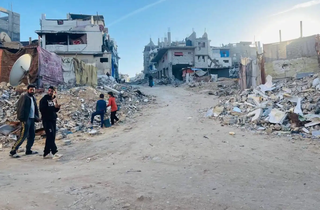This meticulously documented report, titled "Extermination and Acts of Genocide: Israel Deliberately Depriving Palestinians in Gaza of Water," paints a grim picture of calculated cruelty and systemic oppression.
Since October 2023, following Hamas-led attacks, Israel's response has transcended the bounds of military retaliation into a realm of deliberate human suffering. HRW details how Israeli forces have systematically cut off water supplies, destroyed water infrastructure, and blocked aid crucial for water purification and distribution. This isn't merely a by-product of conflict; it's a strategic policy enacted with chilling precision.
Tirana Hassan, HRW's executive director, starkly frames this policy: "Water is essential for human life, yet for over a year, the Israeli government has deliberately denied Palestinians in Gaza the bare minimum they need to survive." This isn't negligence; it's a calculated move, leading to the death of thousands due to dehydration and related diseases, marking it as the crime against humanity of extermination, and unmistakably, an act of genocide.
The report's findings are based on extensive interviews with those on the ground—66 Gazans, employees from Gaza’s water utility, healthcare workers, and UN staff—coupled with satellite imagery and expert analyses. The evidence is clear: Israeli authorities have engineered conditions designed to destroy the Palestinian population in Gaza, both in part and potentially in whole.
The situation escalated immediately post-October 7, 2023, when Israel declared a "complete siege" of Gaza, cutting off all essentials for life—electricity, food, water, and fuel. This siege, upheld despite multiple provisional measures by the International Court of Justice (ICJ), showcases a blatant disregard for international law. The ICJ orders explicitly included the provision of water, yet Israel's continued restrictions suggest a policy aimed not just at controlling but at annihilating.
The physical destruction of water infrastructure, like the Central Gaza wastewater treatment plant, further illustrates the intent behind these actions. From October 2023 to January 2024, this facility was systematically dismantled, with satellite images showing the progression from damaged solar panels to the razing of main buildings by bulldozers.
The health consequences in Gaza are dire. Without adequate water, diseases flourish. Diarrhea, hepatitis A, and various skin and respiratory infections have ravaged the population, with infants, pregnant women, and people with disabilities bearing the brunt of this crisis. The healthcare system, already under siege, cannot track or manage these conditions effectively, leading HRW to estimate that thousands have died due to these water-related health crises, in addition to the over 44,000 killed directly in the conflict.
Moreover, statements from senior Israeli officials, expressing intentions that align with the outcomes of these policies, suggest not only a genocidal intent but also incitement to genocide.
This ongoing blockade and the 17-year closure of Gaza are not isolated acts but part of a broader system of apartheid and persecution, recognized as crimes against humanity by HRW. Yet, international response, particularly from governments continuing to arm Israel, has been tepid at best, thereby risking complicity in these grave violations.
As Hassan urges, "Governments should not contribute to the grave crimes that Israeli officials are committing in Gaza... and should take immediate action to protect civilians." An arms embargo, sanctions, and support for justice are not just recommendations; they are moral imperatives if we are to halt this cycle of suffering and destruction.
The narrative of this conflict must shift from one of mere territorial disputes to acknowledging the systemic, deliberate human rights violations that continue to unfold in Gaza. The world must recognize this for what it is—a genocide by deprivation, a crime against humanity that demands immediate, resolute, and collective action. (ILKHA)



 Güncel
Güncel
 Dünya
Dünya
 Dünya
Dünya
 Güncel
Güncel
 Güncel
Güncel
 Dünya
Dünya
 Güncel
Güncel
 Güncel
Güncel
 Güncel
Güncel
 Güncel
Güncel





